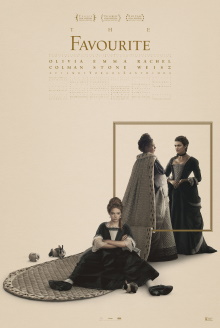
While there is some historical basis for the events depicted in this film, it’s probably best to think of this as fiction that is only loosely inspired by history. The plot is straightforward enough but this film is shot in such a quirky, disorienting style that I immediately wondered who the director is. It turns out to have been directed by Yorgos Lanthimos who shot to fame for the near-indecipherable The Lobster.
In the early 18th century, the sickly Queen Anne reigns over England but it is her best friend and confidante Sarah, the Duchess of Marlborough who rules in her name. At the same time, England wars with France under the generalship of Sarah’s husband. Sarah’s cousin, Abigail Hill arrives in search of a job after her father has gambled away their family fortune. Abigail is at first badly treated as a maid but being shrewd, she forages for herbs to treat the Queen’s gout and is promoted by Sarah. Meanwhile Sarah tries her best to raise land taxes to further fund the war but she is opposed by Robert Harley, the leader of the Tories faction in Parliament. He orders Abigail to spy on his behalf. She in turn witnesses Sarah having sex with the Queen and realizes that she can supplant her cousin as the Queen’s lover.
As we have come to expect from period dramas, the costumes and the decor are all appropriately rich and sumptuous. But what really captures your attention here is the highly stylized photography. The film delights in using wide-angle lenses, resulting in skewed perspectives and the sense of seeing the whole room at the same time. Matching this is a kind of insouciant frivolity and black humor that is ever present. I didn’t find the film funny at all but it does give a surreal feeling to the whole experience of watching it. Soldiers might be fighting, and presumably dying in the ongoing war, but all of that happens offscreen. Meanwhile the aristocrats amuse themselves by racing ducks, Harley literally pushes Abigail over as a kind of sick prank whenever he speaks to her while the Queen is most concerned about her seventeen pet rabbits, one for each of the children that she gave birth to but has since died.
Courtly intrigue and cosying up to the current ruler is commonplace material and this sort of plot is especially prevalent in Asian period dramas. But this execution here is perfect and I do so love that all three of the main characters here are women. Also great is the fact that while Sarah looks like she is usurping the Queen’s authority, she does so because she genuinely believes that it is for the good of the country and it is in the best interests of her friend the Queen. As she tells Abigail, the one of them are playing different games entirely. Abigail makes the clichéd transition from pitiful waif to manipulative power-monger but it’s still satisfying to watch her trample underfoot the men who tried to make her their tools.
The Favourite may not be as innovative as The Lobster but it sure is much more comprehensible. Even if the plot is familiar, Lanthimos’ unique style and the way it places women front and center make it an interesting and worthwhile film.